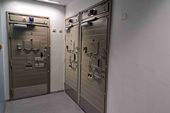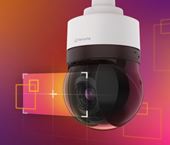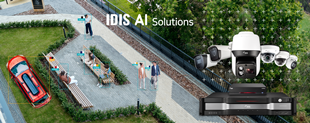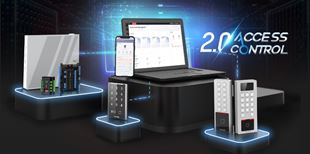AI-enabled innovative teaching methods can help enhance engagement in both remote and in-person classes, and promote a conducive learning environment for students. To better understand how schools can benefit from utilising advanced technologies like AI, below is a description of some of campus applications.
Preventing unauthorised entry into campus
Campus entrances and exits are areas vulnerable to external threats. A robust entrance and exit access control system is imperative in building the school’s first major line of defence.
For example, installing an AI-enabled access control system can effectively prevent unauthorised entry into the campus, library, teaching buildings, dormitories and other school premises. Aside from that, the latest data management technology can be used to meet the daily needs of schools and students (e.g. attendance, visitors, vehicles).
Likewise, perimeter protection, the technology behind tripwire and line crossing function, plays a vital role in preventing invasions in surrounding areas or unauthorised access to regulated places. When unauthorised personnel and vehicles are detected, the system will send a real-time alarm to notify the control room, which can help reduce security risks in the campus. Machine learning helps reduce false alarms by filtering out irrelevant objects like leaves, branches and even animals.
Detect violent actions in real time
Globally, school violence and bullying remains a serious problem. A report by UNESCO and the Institute of School Violence Prevention at Ewha Womans University (Seoul, South Korea) indicated that an estimated 246 million (20%) children and adolescents were subjected to some form of school violence each year. One of the recommended priority actions is to establish reporting systems and improve the collection of data and evidence.
For campus safety, today’s comprehensive security systems have already integrated emergency management features. With the help of an AI sensor, 3D cameras with stereo analysis capabilities can identify fights, falls and other possible violent behaviours through deep learning. With real-time alarm in place, the school’s security personnel can be informed in time about possible emergencies such as violence and falls, allowing them to intervene or respond accordingly. A one-button alarm system is also suggested in the campus premises to provide students with the fastest way to ask for help in case of emergencies.
Improve teaching performance and learning outcomes
Normalcy and resource imbalance during the pandemic have prompted developing countries to accelerate the digital transformation of education. With the unprecedented offline-to-online transition of many classrooms, modern electronic whiteboards and blackboards have emerged. The Dahua Deephub Smart Interactive Whiteboard, for instance, provides an array of features including multifunctional writing, wireless projection, conference content sharing, etc., making it an ideal choice for classrooms and meeting rooms where demonstration, information sharing and document management are needed.
Alternatively, an all-in-one smart blackboard with highly integrated design is also a good option. It combines traditional blackboard writing with touchscreen technology, promoting collaborative human-computer interaction in the classroom.
Moreover, teachers don't have to worry about students who can't participate in in-person classes. An intelligent camera with broadcasting function can automatically track and capture a teacher's lecture through AI algorithm, with an accuracy of up to 99%. It can integrate with multi-channel video streams to vividly restore the classroom scene, providing an immersive remote learning experience for students in different locations.
Best practices
As AI becomes more advanced and continues to gain traction in the security industry, it is imperative to carry out best practices in surveillance monitoring. Educating users regarding proper usage of technology and its benefits is strongly encouraged. Aside from that, data and privacy protection must also be prioritised at all times. Several central management software and platforms combine data and privacy security functions in order to help protect privacy while monitoring. Some of the measures being implemented are minimized data and private information, face/body mosaic technology, as well as security encryption of network transmission, storage, download, and export. Users also have an option to configure the storage duration of each video channel. Overall, these best practices are put into action to help ensure privacy protection and promote responsible monitoring.

















